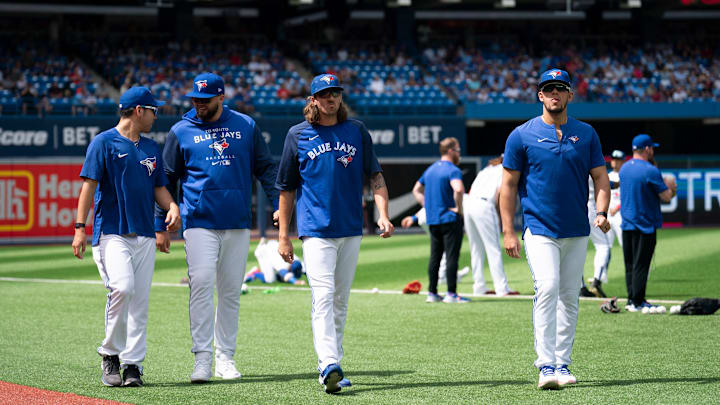While baseball remains America's national pastime, it has fallen behind the NFL and NBA when it comes to popularity and attracting new fans. Part of the issue was perceived to be that games were taking too long to play.
As such, Major League Baseball made the decision to implement a pitch clock for the 2023 season. As per MLB.com, this included a 30-second timer between batters.
In addition, a 15-second timer was put in place between pitches with the bases empty, and a 20-second timer with runners on base. As a result, games now last around two hours and 38 minutes, compared to three hours and three minutes last year.
As much as this should be considered a success for Rob Manfred and the league, what do the players think about the faster games? More specifically, the pitchers?
David Laurila of Fan Graphs decided to find out just that, speaking to 13 Major League pitchers. From a Blue Jays perspective, this included Kevin Gausman and Alek Manoah.
Gausman finds it easier
Beginning with Gausman, he's had more experience than most so far this season with the pitch clock, tied-fifth in the majors for innings pitched as of June. 13. He's also second in the league in strikeouts and is the Blue Jays' staff ace.
As such, it is no surprise to hear the 2021 All-Star likes the faster pace of play. Speaking to Laurila, he said:
"I think it’s easier in the shorter window. It’s less time. In anything, you usually mess yourself up the more time you give yourself. As pitchers, we can only stay hot for so long. If you have a three and a half, four hour game, the in-between innings are going to be long. It’s harder to stay locked in, to stay hot, and because of that it might take you a hitter or two to get loose when you go back out there. You might give up a hit, or even a run."
Manoah sees both sides of the debate
With due respect to Gausman, Manoah's take was always going to be more intriguing. After all, we're talking about a player whose had a significant fall from grace following last year's All-Star campaign which saw him finish third in AL Cy Young voting.
The 25-year-old's struggles this season have been well-documented, with baseball media and analysts everywhere looking to find out what's behind his poor performances. One of the prevalent theories is that he has been negatively impacted by having to speed up his game.
For his part, Manoah was thoughtful in considering both sides of the discussion surrounding the pitch clock. As per Laurila, he said:
"You can look at it both ways. The (longer window) could mean you’re working more, but it could also mean your offense is doing more and you’re doing less. So it would depend on whether the bulk of that time you’re sitting on the bench waiting for your offense to be done, or you’re pitching. Of course, if you’re going seven, you’re probably rolling pretty well and it’s your offense doing the bulk of the work. That said, I think doing it quicker is better. Less time to throw those pitches is better for your body."
Of course, it's up to the Blue Jays to find out what exactly is wrong with the 2019 11th overall draft pick, during his time in the rookie-level Florida Complex League. However, it is interesting that he does not consider the faster pace of play as an issue per se.
Are more changes coming?
Overall, whether it be the 13 pitchers Laurila spoke to or more generally speaking, the debate is still up in the air. As Shane Bieber of the Cleveland Guardians said:
"Good question. To give you a real response on the impact … we’ll probably see at the end of the year after a great big body of work. "
Pending how the season plays out, it will be interesting to see if Major League Baseball sticks with the current time parameters, or increases them. Sometimes you need/want extra time in big moments, to help build up the tension and excitement for fans.
A prime example of this would be the matchup between Mike Trout and Shohei Ohtani, at this year's World Baseball Classic. Not having a pitch clock certainly didn't ruin the moment, which had a feel similar to that of a MLB playoff game.
In this respect, we don't anticipate Manfred and company getting rid of the pitch clock altogether. However, the league must continue to adjust accordingly, to make sure their product remains appealing and relevant to sports fans.
